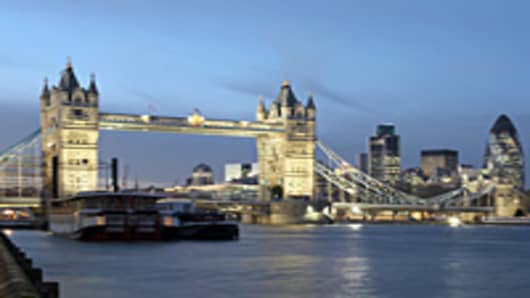The UK officially entered a double-dip recession during the first three months of the year, figures released on Wednesday showed, but budget businesses in the country aren't complaining.
Earlier this week, earnings from the owner of budget fashion retailer Primark showed that British consumers continued to look for a bargain.
Primark parent company AB Foods, which saw sugar sales soar, managed to drive 15 percent revenue growth at Primark where cheap, foreign-made clothes fly off the shelves on high streets across the UK.
On Thursday UK leisure group Whitbread , which owns budget hotels, restaurants and the Costa Coffee brand reported it had a strong year.
Full-year profits were up 11.3 percent following the opening of new stores and 4,000 new hotel rooms to their portfolio.
“The overall UK economy is likely to remain flat and we plan to expand by taking business off our rivals” said Whitbread CFO Christopher Rogers on "Squawk Box Europe" Thursday.
His strategy is to compete for price in hotels and on experience at his fast growing coffee business.
The CEO of UK retailer M&S , Marc Bolland told CNBC on Thursday that Britain needs to look on the bright side as we approach a huge summer for the country.
“We are looking at the best summer the country has ever seen with the Olympics, paralympics, the Queen's diamond jubilee and Wimbledon all being hosted in the UK,” he said.
Bolland dismissed disappointment following a profit miss earlier this year for the fashion and food retailer saying growth of 1.2 percent is not bad in the current environment.
“I am a glass half full kind of a guy,” said Bolland.
UK Struggling
The news saw UK Chancellor George Osborne make it clear there will be no divergence from austerity while an emboldened opposition Labour Party claimed the lack of growth was a direct result of Osborne’s fiscal plans.
Economists were quick to outline just how bad the current climate is in the UK.
“Not only are they worse than expected, meaning the UK has slipped into technical recession, but also the composition of GDP is particularly worrying,” said Simon Wells, the Chief UK economist at HSBC, following the GDP data.
“We had expected a huge contraction in construction to offset a modest recovery in services growth. In the event, services barely grew in contrast to the steer given by a rebound in the services PMI survey this year,” said Wells, who believes Britain has just experienced a “lost year” and predicts little improvement going forward.
Osborne’s fiscal austerity has given the UK credibility in the bond market, helping to protect Britain’s millions of home owners from higher mortgage payments, but some believe the UK’s treasured AAA rating is under threat.
“Britain is still in risk of being downgraded. I still think one or more rating agencies will strip the UK's AAA,” said John M. Hydeskov, the chief analyst at Danske Markets in an interview with CNBC.com.
Hydeskov raised eyebrows late last year when he predicted Britain’s credit rating was at risk, but he thinks the three major ratings agencies will be worried by the slide back into recession.
“The problem is the underlying growth rate which is considerably lower than previously anticipated” said Hydeskov.



